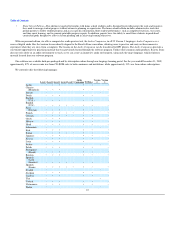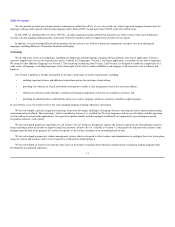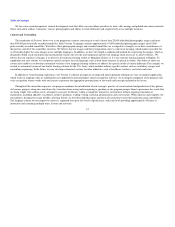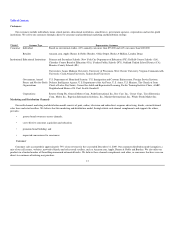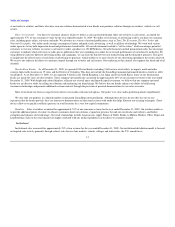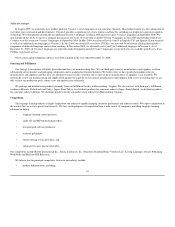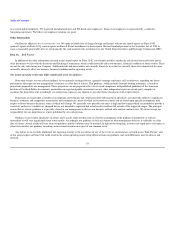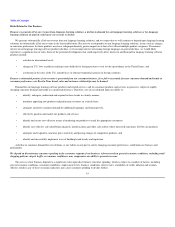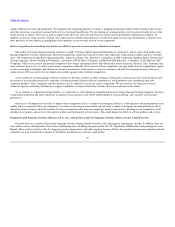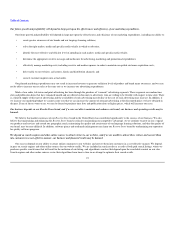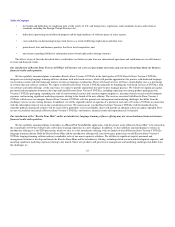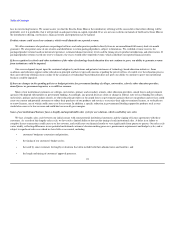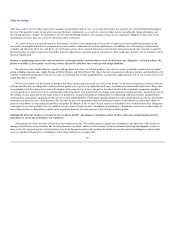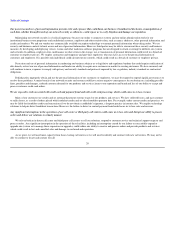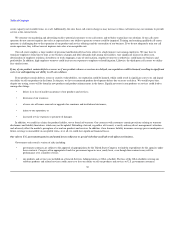Rosetta Stone 2009 Annual Report Download - page 22
Download and view the complete annual report
Please find page 22 of the 2009 Rosetta Stone annual report below. You can navigate through the pages in the report by either clicking on the pages listed below, or by using the keyword search tool below to find specific information within the annual report.
Table of Contents
which could hurt our sales and profitability. We depend on the continued popularity of malls as shopping destinations and the ability of mall anchor tenants
and other attractions to generate customer traffic for our retail mall-based kiosks. We also depend on continued airline travel to generate traffic for our retail
kiosks located in airports. Decreases in mall or airport traffic adversely affect the sales from our kiosks and our profitability and financial condition. In
addition, an increase in the taxation of online sales could result in reduced online purchases or reduced margins on such sales. Furthermore, consumers may
defer purchases of our solutions in anticipation of new products or new versions from us or our competitors.
Intense competition in our industry may hinder our ability to generate revenue and may diminish our margins.
The market for foreign language learning solutions is rapidly evolving, highly fragmented and intensely competitive, and we expect both product and
pricing competition to persist and intensify. Increased competition could cause reduced revenue, price reductions, reduced gross margins and loss of market
share. Our competitors include Berlitz International Inc., Simon & Schuster, Inc. (Pimsleur), a subsidiary of CBS Corporation, Random House Ventures LLC
(Living Language), Disney Publishing Worldwide, a subsidiary of Walt Disney Company, and McGraw-Hill Education, a subsidiary of The McGraw-Hill
Companies. Many of our current and potential competitors have longer operating histories and substantially greater financial, technical, sales, marketing and
other resources than we do, as well as greater name recognition worldwide. The resources of these competitors also may enable them to respond more rapidly
to new or emerging technologies and changes in customer requirements, reduce prices to win new customers and offer free language learning software or
online services. We may not be able to compete successfully against current or future competitors.
As the market for foreign language solutions continues to develop, a number of other companies with greater resources than ours could attempt to enter
the market or increase their presence by acquiring or forming strategic alliances with our competitors or our distributors or by introducing their own
competing products. These companies and their products may be superior to any of our current competition. We may not have the financial resources,
technical expertise, marketing, distribution or support capabilities to compete effectively with any of these new entrants to the market.
As we continue to expand into foreign markets, we expect that we will experience competition from local foreign language learning companies that have
strong brand recognition and more experience in selling to local consumers and a better understanding of local marketing, sales channels and consumer
preferences.
Our success will depend on our ability to adapt to these competitive forces, to adapt to technological advances, to develop more advanced products more
rapidly and less expensively than our competitors, to continue to develop an international sales network, to adapt to changing consumer preferences and to
educate potential customers about the benefits of using our solutions rather than our competitors' products and services. Existing or new competitors could
introduce new products and services with superior features and functionality at lower prices. This could impair our ability to sell our products and services.
Demand for paid language learning solutions such as ours could decline if effective language learning solutions become available for free.
Presently there are a number of free online language websites offering limited vocabulary lists and grammar explanations and tips. In addition, there are
some online services offering limited free lessons and learning tools, including one sponsored by the U.S. Department of Education to help immigrants learn
English. Many of these websites offer free language practice opportunities with other language learners. If these free products become more sophisticated and
competitive or gain widespread acceptance by the public, demand for our solutions could decline.
20


